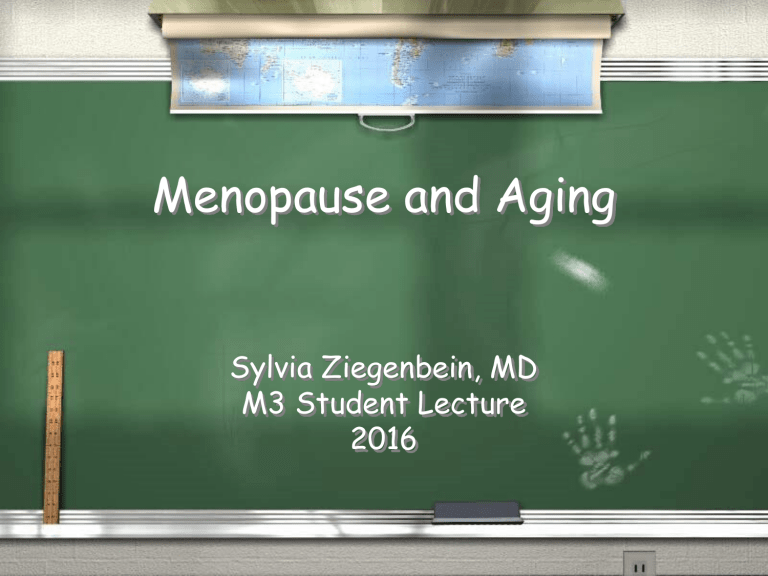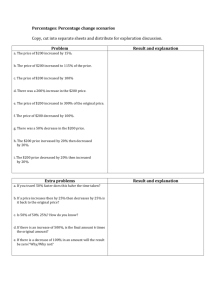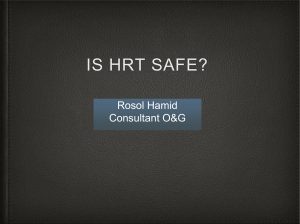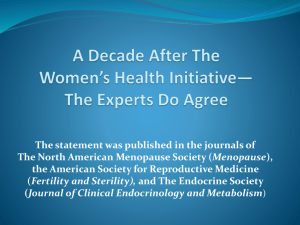Menopause and Aging Sylvia Ziegenbein, MD M3 Student Lecture 2016

Menopause and Aging
Sylvia Ziegenbein, MD
M3 Student Lecture
2016
Objectives
Define menopause
Describe associated changes and symptoms
Treatment options for bothersome
symptoms
Review physiologic changes of aging, specific age related problems and screening in elderly
Case #1
35 yo G1 P0101 female presents with c/o hot flashes and amenorrhea for 12 months.
She doesn’t know why this is happening, her sxs are worsening. She wants your help.
DDx
Tests
Premature Ovarian Failure
<40
Idiopathic
300x increased risk of adrenal insufficiency
Anti adrenal and Anti 21-hydroxylase antibodies
Surgical, radiation, chemotherapy
Chromosomal- 45XO, Fragile X
Infectious-mumps, cmv
Autoimmune
Galactosemia
Increased risk of osteoporosis
Case #2
45 yo G2 P2002 female presents with c/o hot flashes and irregular menses (q 3-5 mos) for the past 9 months. She doesn’t know why this is happening, she wants your help. By the way, she wants your help to stop smoking also.
DDx
Tests
Case #3
65 yo WF presents to start HRT. She heard it would help protect her heart, make her feel younger and help her memory. She went through menopause 10 years ago and has not had any problems except an occasional hot flash. She is 5’4”,
108 lbs. By the way, she had a wrist fx 2 yrs ago takes her Viactiv faithfully.
Case #4
49 yo WF presents b/c she can’t stand her hot flashes anymore. She can’t sleep very well b/c she wakes up 3 times a night drenched with sweat. She is an executive at First National Bank. She has a history of breast cancer 2 years ago. “Please Dr.
Ziegenbein, I need some hormones or something.”
Case #5
55 yo BF returns to discuss stopping her HRT. She has been taking it for 5 years now with good relief of her vasomotor sxs.
Case #6
53 yo WF began continuous HRT 4 wks ago. She is now having some vaginal spotting after being amenorrheic for 14 months. She is concerned.
Menopause
Definition
Average Age
Related Sxs
Classification System
STRAW System
Help communication
Menopause Terminology: STRAW* Staging System
*
*STRAW = Stages of Reproductive Aging Workshop.
Stages most likely to be characterized by vasomotor symptoms.
Soules MR, et al. Menopause. 2001;8:402-7.
Vasomotor symptoms:
Why don’t we treat every women with hormones?
WHI: HRT vs Placebo
Large prospective RCT, 2002, JAMA
16,608 postmenopausal women (50-79 y.o.)
Ave age at enrollment = 63 yrs
Two arms:
Estrogen + Progestin (Prempro 0.625/2.5), n=8506
Placebo, n=8102
Outcomes measured:
Primary : Coronary heart disease (CHD) and invasive breast cancer
Secondary : stroke, pulmonary embolism, DVT, endometrial
CA, colorectal CA, hip and vertebral fractures and death from other causes
HRT Arm: Stopped Early @ 5.2 yrs
Invasive Breast Cancer = 38 vs 30/10,000
person yrs ( HR 1.26
)
CHD = 37 vs 30/10,000 ( HR 1.29
)
Stroke = 29 vs 21/10,000 ( HR 1.41
)
Venous Thromboembolic disease = 34 vs
16/10,000 ( HR 2.11
)
Colorectal cancer = 10 vs 16/10,000 ( HR 0.63
)
Hip fracture = 10 vs 15/10,000 ( HR 0.66
)
Vertebral fracture = 9 vs 15/10,000 ( HR 0.66
)
No change in endometrial and lung cancer
WHI: Estrogen Only vs Placebo
WHI 2004: JAMA
10,739 postmenopausal women
s/p hysterectomy (50-79 y.o.)
Ave. age @ enrollment = 63.6 y.o.
Two arms:
Estrogen (Premarin 0.625 mg), n=5310
Placebo, n=5429
Outcomes:
Primary: CHD and invasive breast cancer
Secondary: stroke, pulmonary embolism, DVT, colorectal cancer, hip/vertebral fractures and death from other causes
Outcomes
Ave. follow up 6.8 years (Hazard Ratio)
Invasive breast Cancer = 26 vs 33/10,000
person yrs (0.77)
CHD = 49 vs 54/10,000 (0.91)
Venous Thromboembolic disease = 28 vs
21/10,000 ( 1.33
)
Stroke = 44 vs 32/10,000 ( 1.39
Fatal = 4 vs 4/10,000 (1.13)
Nonfatal = 32 vs 23/10,000 (1.39)
)
Colorectal cancer = 17 vs 16/10,000 (1.08)
Hip fracture = 11 vs 17/10,000 ( 0.61
)
Vertebral fracture = 11 vs 17/10,000 ( 0.62
)
Hazard Ratio, 95% confidence interval
Clinical Event
CHD Events
Stroke
HERS E+P
0.99 (0.80-1.22)
WHI E+P
1.29 ( 1.02-1.63
1.23 (0.89-1.70) 1.41 ( 1.07-1.85
)
)
Pulm. Embolism 2.79 (0.89-8.75) 2.13 ( 1.39-3.25
)
Breast Cancer
Colon Cancer
1.30 (0.77-2.19) 1.26 ( 1.00-1.59
)
WHI E alone
0.91 (0.75-1.12)
1.39 ( 1.10-1.77
)
1.34 (0.87-2.06)
0.77 (0.59-1.01)
0.69 (0.32-1.49) 0.63 ( 0.43-0.92
) 1.08 (0.75-1.55)
Hip Fracture
Death
Global Index
1.10 (0.49-2.50)
1.08 (0.84-1.38)
-
0.66 ( 0.45-0.98
0.98 (0.82-1.18)
1.15 (1.03-1.28)
) 0.61 ( 0.41-0.91
1.01 (0.89-1.70)
)
1.04 (0.88-1.22)
Menopausal Complaints: Treatments
Hormones
vs
Non-hormones
vs
Herbals
Efficacy?
Treatments
First
Staying cool, avoid triggers
Exercise, healthy lifestyle
Vitamin E
Hormones Contraindicated
Breast CA
Endometrial CA
Undiagnosed vaginal bleeding
CHD
Venous thrombosis
Stroke
Pregnancy
What is not here, that is a CI on OCP’s?
OB/GYN Mantra from WHI
Lowest dosage for the least amount of time.
Hormones
Estrogen and progesterone
Pills, patches
Estrogen only
Oral-Pills
th
Topically or transdermal-gels, patches
Vaginally-creams, rings and tabs
Progestins only, are also effective
Non-Hormonal Medications
SSRI- paroxetine (Paxil)
60-65% effective
SNRIs- venlafaxine (Effexor)
60-70% effective
Gabapentin-(Neurontin)-anti seizure
60-70% effective
Sedating
Clonidine- anti hypertensive
45-50% effective
Herbals:
Not FDA regulated
Efficacy equal to placebo
Black cohosh
Red clover
Soy
Flaxseed
Dong quai
Wild Yam
Ginseng
Evening primrose oil
Other Treatment Methods
Acupuncture
Reflexology
Magnetic devices
Specific Geriatric Issues
Other assessments to be made.
Demographics
34 million elderly now
69 million in 2030
Gerontology
Health in the aged
Absence of ds
Maintain function and comfort
Presence of satisfactory support systems
Osteoporosis
Screening
Start at 65, earlier if risk factors
Risk Factors
Treatments
bisphosphonates
Screening
Thyroid
Cancer
Sxs
Pap
Mammogram
ACS-yearly from 45-54, then every other year
ACOG-every 1-2 yrs 40-50, then every year
USPSTF –every other year starting at 50
Colonoscopy
Lipidsrisk based, usually 45yoa for healthy women
Incontinence
Types
Risk factors
Assess
Tests
Treatment
Types of Incontinence
Urge
Stress
Functional
Overflow
Mixed
Fall Risks
Intrinsic
Person oriented issues…
Mobility
“Get up and go” test
Extrinsic
Environment
Polypharmacy
Medication List
Drug-drug interactions
Altered pharmacokinetics,
pharmacodynamics
Herbals
OTC
Others
Abuse
Sexuality
Vaccinations
Financial
Support System
Driving
Normal Physiologic Changes of Aging
Body Composition and
Homeostasis
Decrease muscle mass
Increase body fat
Changes volume of distribution
Impaired baroreceptor
Orthostatic hypotension
Impaired thermoregulation
Cardiovascular
Decrease LV compliance
Increased reliance on atria
More LVH
Stiffer arteries
Decreased beta-adrenergic responsiveness
Decreased max. HR with exercise
Pulmonary
Decreased elastic recoil, airways collapse
earlier
Decreased forced vital capacity, functional
residual capacity, residual volume, FEV1
Decreased ventilatory response and chemoreceptor function
Increased hypoxia and hypercapnia
Renal
Decreased mass, # of glomeruli
Increased glomerulosclerosis
GFR slowly decreases
CrCl maintains
Decreased Na+ rentention, decreased responsiveness to AVP; less concentration of urine
Decreased thirst and drink response
Increased dehydration
Endocrine
Decreased glucose tolerance
Independent of obesity and inactivity
FG decreases 1 mg/dL/decade
Increased insulin resistance
Decreased GH, IGF-1
Give elderly men GH, increases lean body mass
Immunologic
Decreased T-cell activity
Decreased Ab response to foreign
antigen
Increased autoantibodies
Cognitive Function
Normal decline
Dementia
Alzheimer’s
Vascular
Others
Depression
Medications
EtOH
MMSE
Visual
Auditory
Balance
Sensory
Questions???
Thank you very much for your participation!!
Good luck on your shelf!



